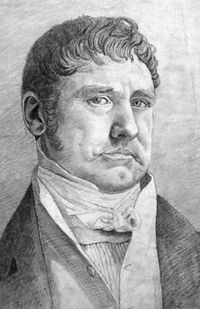William Gell 1777 – 1836
January 03, 2009
 William
Gell 1777 – 1836 was an
English classical archaeologist. He was a fellow of the Royal
Society and the Society of
Antiquaries of
London,
and a member of the Institute of
France and the Royal
Academy in
Berlin.
William
Gell 1777 – 1836 was an
English classical archaeologist. He was a fellow of the Royal
Society and the Society of
Antiquaries of
London,
and a member of the Institute of
France and the Royal
Academy in
Berlin.
William Gell became a member of the Society of Dilettanti in 1807 (http://socialarchive.iath.virginia.edu/xtf/view?docId=society-of-dilettanti-london-england-cr.xml). The 2nd Quinquennial International Homeopathic Congress was held in London in on 11th-18th July 1881 at the Dilettante Club, Aberdeen House, 7 Argyll Street, Regent Street (Anon, The Medical Counselor, Volume 7, (The Michigan State Homeopathic Society, 1883). Page 347. See also Anon, The Homeopathic World, (August 1,1881). Pages 337-349).
William Gell was an advocate of homeopathy (Anon, The Journal of the British Homeopathic Society, Volume 9, (1882). Multiple pages), and he consulted homeopath Georg von Necker, and he was a friend of Frederick Hervey Foster Quin, the Countess of Blessington and John Gardner Wilkinson.
Born at Hopton in Derbyshire, the son of Philip Gell and Dorothy Milnes (daughter and coheir of William Milnes of Aldercar Park). The Gell family was one of the oldest families in England with a tradition of service in the Army, Navy, Parliament and the Church going back to 1209, in the reign of King John.
His great grandfather was the parliamentarian Sir John Gell and his uncle was Admiral John Gell.Gell was educated at Derby School and Emmanuel College, Cambridge. He matriculated there in 1793, took a BA degree in 1798 and an MA in 1804, and was elected a fellow of Emmanuel.
From 1804 to 1806 he travelled in Greece and the neighbouring islands. He was in 1807 elected a Member of the Society of Dilettanti and a Fellow of the Royal Society. In 1811 the Society of Dilettanti commissioned him to explore Greece and Asia Minor.
These travels resulted in several publications, e.g. Geography and Antiquities of Ithaca and Itinerary of Greece, with a Commentary on Pausanias and Strabo. With these publications he achieved fame in the scholarly circles as a classical topographer.
He went with Princess (afterwards Queen) Caroline to Italy in 1814 as one of her chamberlains, and gave evidence in her favour at the trial in 1820. He was Knighted on 11 May 11 1814.
Gell was a close friend of Keppel Richard Craven and travelled around Italy with him. He died at Naples in 1836 and was buried in the English Cemetery, Naples. On his death he left all his personal belongings to Keppel Richard Craven.
His numerous drawings of classical ruins and localities, executed with great detail and exactness, are preserved in the British Museum. Gell was a thorough dilettante, fond of society and possessed of little real scholarship. Nonetheless his topographical works became recognized text-books at a time when Greece and even Italy were but superficially known to English travellers.
He was a fellow of the Royal Society and the Society of Antiquaries of London, and a member of the Institute of France and the Royal Academy in Berlin.
His best known work is Pompeiana; the Topography, Edifices and, Ornaments of Pompeii, published between 1817 and 1832, in the first part of which he was assisted by John Peter Gandy. It was followed in 1834 by the Topography of Rome and its Vicinity. He wrote also Topography of Troy and its Vicinity (1804); Geography and Antiquities of Ithaca (1807); Itinerary of Greece, with a Commentary on Pausanias and Strabo (1810); and Itinerary of the Morea (1816). Although these works have been superseded by later publications, they continue to provide valuable information for the study of classical topography.
He is, together with his friends Edward Dodwell and Keppel Richard Craven, by some modern scholars seen as the founder of the study of the historical topography of the hinterland of Rome.His works and notebooks proved very valuable for the topographical studies done by Thomas Ashby at the beginning of the 20th century.